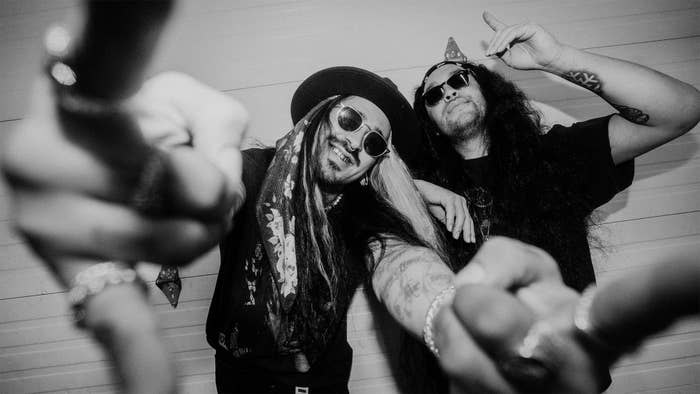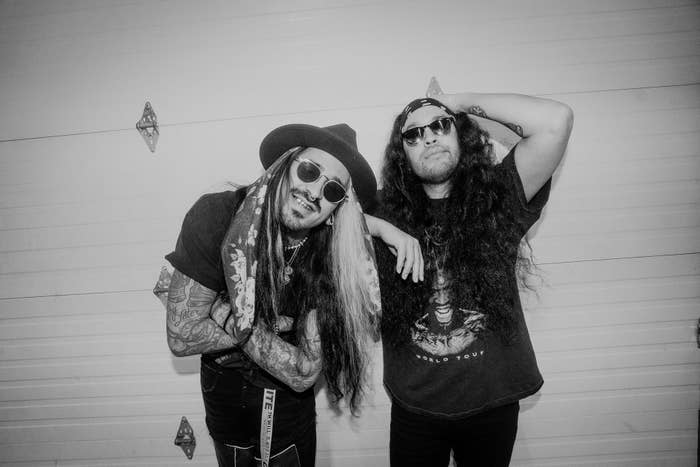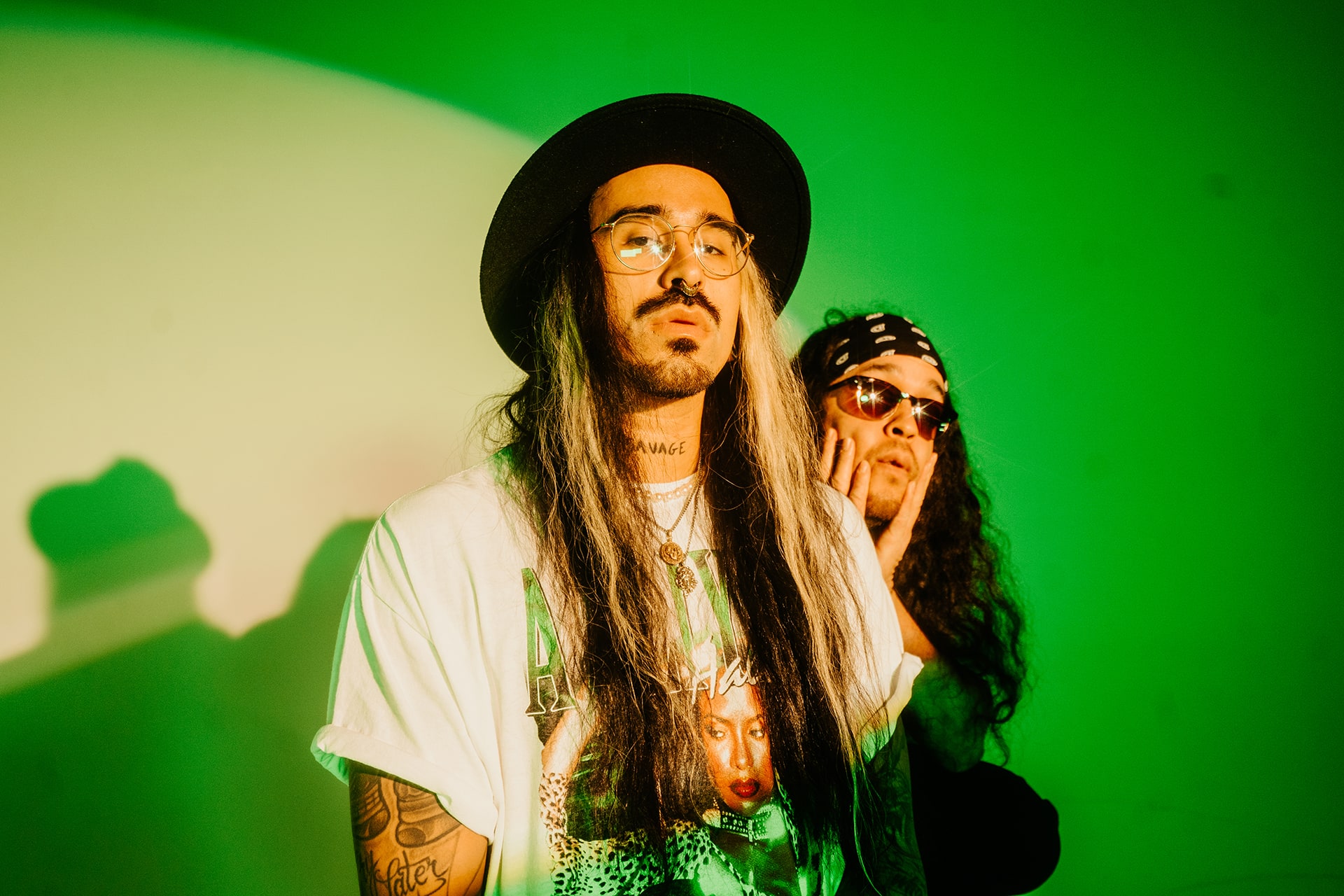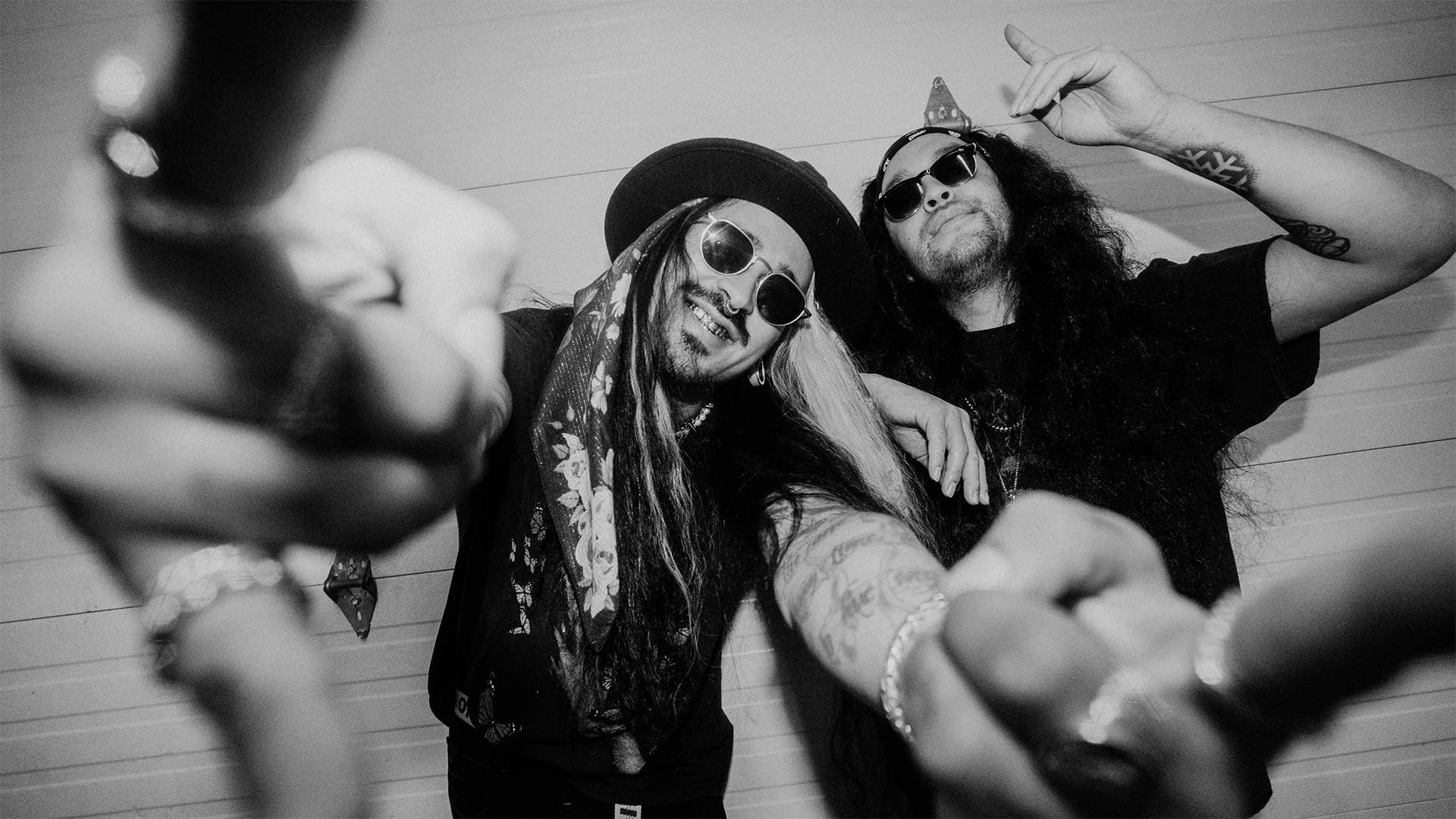
During their set at a festival in central Canada this summer, Snotty Nose Rez Kids stage dived into a crowd of over 10,000. They’d dreamed of doing so throughout months of pandemic lockdowns, during which the Vancouver-based First Nations hip-hop duo grappled with isolation and mental health woes, not to mention grieving a loved one.
The audience’s frenzied response to “Sink Or Swim,” a scorched-earth sizzling rager from their new album Life After, out today (October 22), felt like a cathartic, well-earned return to normal for the duo, at first. Then it got surreal. “That’s our thing, usually—get down in the crowd, and start the mosh pit up,” says Quinton “Yung Trybez” Nyce, one half of Snotty Nose Rez Kids, during a recent interview over Zoom. He adds: “We opened the pit up for everybody, a hundred feet at each end. And we got everyone to rush us when the beat dropped. It was the biggest mosh pit I’d ever been in, in my life.”
“I’m usually not scared of mosh pits. But I was scared for that one,” Darren “Young D” Metz recalls of being immersed in that enthused crowd with his Snotty Nose Rez Kid cohort. He adds: “I got my hair pulled and shit. It was ruthless!”

The pair of high-energy, infectious-hook-sketching, politically-charged rappers (who are from the Haisla First Nation) are certainly eager to perform those new Life After songs on a North American tour kicking off on Oct. 25, especially after a soul-straining lockdown. From the melancholy-yet-yearning “Change,” to the documentary grit of “Déjà Vu,” Life After’s thirteen tracks vividly address the poverty, systemic addiction, and suicide epidemic gripping Canada’s reserves. The rappers also address the police brutality disproportionately affecting Indigenous peoples, the links between religious corruption and the mass children’s graves found at former residential schools this summer, and more on the album.
“We’ve been silenced for so long as Indigenous youth. We were taught to hate ourselves and the people who look like us.”
Below, Snotty Nose Rez Kids tell us all about Life After.
How exciting is it to perform your new songs live after being under lockdown?
Yung Trybez: After sitting on our asses for the past 15 months, all we’ve been able to do is create. With that comes a lot of time to practice and hone in on our craft, to figure out what we want and how we want to do it. Over these past 15 months we’ve also made a lot of demos, and with that comes experimenting, finding different cadences and flow styles, and trying different things. So we’ve really been able to figure out what sound we want on this project.
Young D: Also, just like everybody else, this pandemic affected us mentally and emotionally. On top of that, me and Quinton have gone through so much shit in our personal lives. And music was our outlet. That’s why this record became what it became.
Yes, I read that your friend Taran Kootenhayoo, your tour DJ, DJ Kookum’s, brother took his life at the end of 2020. My condolences. Please tell us more about how your artform helps you deal with such a loss.
Young D: Oh 100 percent, it’s everything. If it wasn’t for music, I know I wouldn’t be here. I can be very private and introverted. And when you feel like people don’t understand you, music is what you can turn to. Because it’s the universal language. When DJ Kookum lost her brother, rest in sweet peace, that hit the community hard. And just seeing how much of an impact he made on our lives, all across Turtle Island, was bittersweet. Because it was only after he passed that he got his roses. We just wanted to carry on his spirit. That’s why we have songs like “Change,” “After Dark, “Déjà Vu,” and “Sink Or Swim” on the new album.
“There’s a lot of accountability that needs to taken. Even with Indigenous kids being dug up across Canada—we knew that it was there, but it still hurt the same when the truth finally came out.”
Yung Trybez: I completely agree with what D’s saying. Couldn’t have said it better myself. All I can really add is outside of being able to listen to music, we’re blessed in a way that we’re able to create music. I feel that we, as humans, are put here to create and get things off our chest. We use music as a creative outlet, and to get our brains working in a proper way. Without that, I’d be in a very dark place. I lost a lot of people to what we lost DJ Kookum’s brother to over the years. Music has helped me get through those times. Not to say what Darren said, “Without music I wouldn’t be here.” But without music I wouldn’t be here. I wouldn’t be in this spot, with the people I have in my life right now. I wouldn’t have known Darren and had the privilege to experience life with him. So I owe everything I have to music and to be able to create in a way that has put me in this position.
Young D, when you mentioned your friend not getting his flowers until he passed on, do you think experiences like this help people better seize the moment? To not take things or people for granted?
Young D: 100 percent. It’s always eye opening. Like Quinton said, we’ve lost family to that. He lost his cousin, basically his big brother. I lost a cousin a couple of years back, and she was like a little sister to me. It really makes you want to push any bullshit aside and say, “Yo, I love you. And I want you to know that I’m proud of you.” Just give people their flowers, man. Because it sucks when people die before that. And give your flowers to your damn self, man. It’s important. It’s not a crab in a bucket mentality. It’s all love where we are.
As far as giving yourself flowers—tell us more about the self-love rhymes on this album, and why that’s important.
Young D: We’ve grown a lot, as artists and individuals. Part of that growth is unconditional self-love. That allows us to uplift other people.
Yung Trybez: The whole record is drizzled with those feels. We show a lot of us loving ourselves in our music. Especially as of late. And we do address that there’s a difference between being braggadocious and loving yourself. Because people will often confuse ego with self-love.
Young D: Facts.

Yung Trybez: We’ve been silenced for so long as Indigenous youth. We were taught to hate ourselves and the people who look like us. So on this album, we have songs like “Humble Me.” It’s about recognizing that Darren and I arrived with nothing, and music not only got us materialistic shit, but also the people we have in our lives right now. The life we have is all because of music. That song is about it being OK to talk your shit, but you should also check yourself. That’s toward the end of the album, and prior to that, we’re like “Let me talk my shit.” We want to let the youth know you can have a good life through the arts, as long as you put in the work and do what it takes to maintain it. And attain it.
Aside from “Humble Me,” another key track is “After Dark,” especially the line about “breaking the cycle.” What compelled you to rap about that?
Young D: My girlfriend and I hit a dark period. She lost her first cousin, who was basically like a big sister. And she was young, early 40s. Cardiac arrest. I was going through that with her. And I hadn’t drank or smoked in awhile. But then I wrote that first verse, “I’ve been sippin’ again.” And everything just came out of me on that track. You know, self-love isn’t just about being confident and talking shit. It’s also about being vulnerable. So it felt good to have records about that, like “After Dark” and “Change” on the album. Because people don’t really see that side of me and Quinton. They see us talking about “resist, revive, Indigenize, fist up.” They don’t see us at our most vulnerable, when we’re like “I’m hurting, but I’m still going.”
Yung Trybez: That’s true. And “After Dark” was really important for us to put at the end of the album, because it brings us down to earth. After “Humble Me,” we’re just letting people know that we’re humans too. There’s more to us than what you see on the surface. “After Dark” is us when the spotlights are off, when we’re off social media, and just chilling in the comfort of our homes. We have problems, and this is how we deal with it—through self-love, self-care, family, and making sure we’re alright, so that we can make sure our kin is right.
Before those closing songs that bring the record back to earth, Life After has some very galvanizing opening tracks. Like on “Red Sky At Night,” which has lyrics like: “Oh Canada/I’m mad at ya/What you put us through/Made us savage, boo.”
Yung Trybez: We wrote that song two years ago. I was thinking about the Colten Boushie case that happened around then. And the murdered and missing Indigenous women and men inquiry. Even Truth and Reconciliation—there’s no reconciling without exposing those truths. So for me, when we put together “Red Sky At Night,” I was back in my homelands in the middle of the summer. And there was a red sky one night, which reminded me of my Dad, who was a fisherman and would say “red sky at night, sailor’s delight.” Which means tomorrow will be a good day. So for me, when I put together the concept of that song, I meant that there’s hope in tomorrow. My verse is about how the society we live in turns a blind eye, and it doesn’t matter to them what happens to us as Indigenous people. We don’t matter unless it’s put right in front of them. But for us, that’s our daily life.

It’s wild that you wrote that a while ago. The “red sky at night, sailor’s delight” theme could’ve been tied to the 2020 Mi’kmaq lobster dispute. It must be difficult to know slow progress keeps these songs relevant.
Young D: That’s when you know it’s real. When it ages well. We have songs we wrote a year or two ago, or songs from our first album, that are relevant today. That’s what we love to do—make timeless music. Not just what’s the wave right now. Our goal is always to be our own wave. We take inspiration from current events, and our own lives. These things have to be said, whether it’s straightforward or in a poetic way, these things have to be talked about. Otherwise people are just going to continue to ignore the truth.
Yung Trybez: The fact that I wrote “Red Sky At Night” awhile ago just goes to show how much is going on with Indigenous people in Canada, how much is being overlooked, and how much just stays the same. There’s so much out there for us that has been covered up, through conspiracies in our government, that you have to put a name to it. Because there’s so much dirt that needs to be dug up, for us to get our truth out.
There’s a lot of accountability that needs to taken. Even with Indigenous kids being dug up across Canada—we knew that it was there, but it still hurt the same when the truth finally came out. I talk about it on “After Dark,” and the pain I feel when I think about it. No matter what we talk about, it’ll still be relatable 10 or 20 years down the line. Because so much truth needs to be told.
Stream Life After below.


